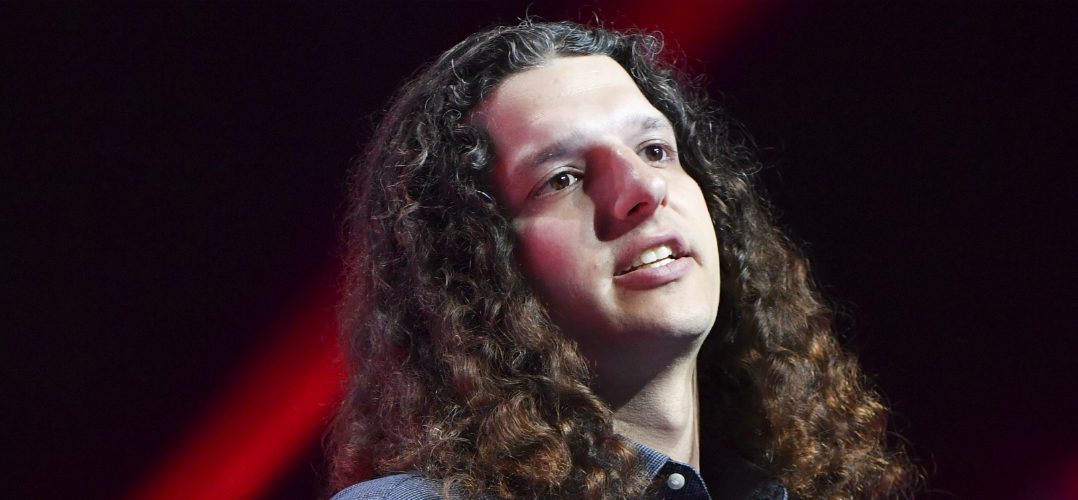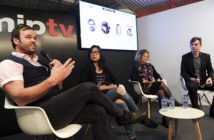A digitally-focused first MIPTV morning kicked off with a keynote from Matthew Henick, head of content strategy and planning at Facebook (top photo).
He began by noting that some technology may not get the support it deserves, because it doesn’t fit into the current golden age. “The issue with these golden ages is innovation becomes harder; it reduces creative risk-taking,” Henick said. “If you go out with a pitch that doesn’t fit this package, people don’t know what to do with it.”
Currently, Henick observed, “there’s two golden ages happening at once—the proclaimed golden age of TV, and the golden age of movie franchises”: More series are being made than ever before, and Disney and other studios can reliably release $150 million franchise movies monthly, with a reasonable expectation to turn a profit. Even Netflix is more like TV than we think; while it’s available on any platform, 70 percent of Netflix consumption happens on a television.
“It’s rare that two golden ages happen at once, and we’re seeing unprecedented things happening in our industries,” he continued. “They’re basically becoming the same”—for example, Disney and Fox joining forces to create something similar to Netflix.
“The problem is, the biggest checkbook wins now,” Henick said. “I used to flippantly say that if you’re a content creator not making money right now, pack up and do something different. I realised the money is being concentrated on senior talent. A lot of creatives are being left out.”
He also underscored the importance of treating mobile differently from television. TV isn’t a social device; it’s a window, he insisted: “When you look at someone through your hotel window, it’s not like you’re having an active conversation with them.”
Phones, though, are inherently connective. The inevitable result of content creation on this technology is social entertainment—where you have two scripts, one for actors and one for the audience, facilitating constant engagement and active consumption. Social content prioritises connection. Consider Buzzfeed’s Tasty, which is programming both recipe videos and viewers’ eating habits at once. People tag friends and suggest making a recipe, then share their own photos.
There’s also the series SKAM on Facebook, which can be watched weekly. But when a character goes to a party at 2am, that party is livestreamed on Facebook at 2am.
“You can enter a character’s universe and live in it, not like when you’re just binge-watching in your room for seven hours,” Henick pointed out.
“Social content frees you from format; there’s no running time to hit, and the audience tells half the story. It’s not that everything has to be interactive, but they’re bringing their own context to it and reacting to it,” he went on.
The good news is social content makes IP more valuable. “You have to think in terms of funnels, not windows; it’s not zero sum,” he added, before leaving us with the following takeaways:

This morning’s other Media Mastermind keynote came from Yang Weidong, president of Youku and Alibaba Media & Entertainment Group. He spoke about how the Chinese video-streaming service has been successfully bridging the internet and broadcast worlds, while reaching more than 500 million monthly active users.
 He noted a 100% year-on-year increase in subscription video-on-demand revenues in China, where there are 579 million online video users – 75% of all internet users in the country. “This creates a fantastic opportunity for our industry. And also more and more users are willing to pay for high-quality content,” he said. “This is very good news for the whole industry.”
He noted a 100% year-on-year increase in subscription video-on-demand revenues in China, where there are 579 million online video users – 75% of all internet users in the country. “This creates a fantastic opportunity for our industry. And also more and more users are willing to pay for high-quality content,” he said. “This is very good news for the whole industry.”
Weidong admitted that it can be difficult to predict “what the audience of tomorrow will like” in the rapidly-changing online-video world. He suggested that personalisation will be key, as well as ever-higher quality. “In order to capture their attention, we need to tailor our shows that surpass their expectations, through new visual aesthetics, and adopting new ways of expressing the content,” he said.
One example is a show, The Street Dance of China, which has the production values of western shows like American Idol and X Factor. “AI and data can bridge the gap between users and contents. They help us to define consumers, identify their needs, and to guide content creation and distribution,” he said. “We call it ‘Hollywood meets Silicon Valley’.”
Weidong also stressed the need for innovation around stories and production models alike, citing detective drama series Day and Night as an example, for which Youku recently signed a worldwide distribution deal with Netflix to take it beyond China. “Today, serial drama is still the major content type that drives the growth of paid subscriptions,” he said. “Drama serials have become the most important content type for paid subscriptions… One. Drama serials often have more complicated storylines. Two: drama serials in China have longer broadcasting lifespans. This helps drama series encourage more users to pay for content.”
However, variety shows – especially those that innovate in the genre – are also playing an important role, representing the brand image of an online platform like Youku. “We need to bring our audience, especially young people, a whole new watching experience,” said Weidong. “Original is essential for online variety shows.”
He went on to talk about Alibaba’s overall ecosystem, which takes in music and games as well as television, plus literature and comics in the offline world. A show brand can spread across all these media. “We can maximise the potential of content monetisation,” said Weidong. He cited a partnership with Kung Fu Panda “achieving revenue records of 165m RMB [around $26.1m]in just one week”.
 World Screen’s Anna Carugati-Guise joined Weidong for the Q&A section of his keynote, and asked about the online-video landscape in China. “The game is not over yet. In China, the online-video industry is very competitive,” he said. “Five years ago, we were maybe one of 10 players in China, for online-video streaming. Last year, there were six major players. And now we are three major players. So it’s very competitive… and the content has become more and more expensive… because of the three rivals.”
World Screen’s Anna Carugati-Guise joined Weidong for the Q&A section of his keynote, and asked about the online-video landscape in China. “The game is not over yet. In China, the online-video industry is very competitive,” he said. “Five years ago, we were maybe one of 10 players in China, for online-video streaming. Last year, there were six major players. And now we are three major players. So it’s very competitive… and the content has become more and more expensive… because of the three rivals.”
As for China’s opening up to the rest of the world, Youku is actively looking for help on this. “More and more, international players – big players – come to China, and to Youku,” he said. “We need drama series and variety show formats, and also animation. I think the international experience and international production quality is still more advanced than our local production teams. We’ll catch up, but I think the global major production players can help us to improve our production quality, through cooperation. So we are starting to explore the possibility to coproduce variety shows, drama series and animation.”

How do you ideate for a mobile platform where content is best known for … disappearing? In a workshop on producing series for Snapchat, chief content officer Lauren Anderson of the NBC/Snap Joint Venture told us, with moderation from founder Drew Baldwin of Tubefilter.
The people watching scripted content on Snap, Anderson observed, are the same ones watching The Office or Game of Thrones on TV. “People want great shows,” she said. “All the fundamentals of great TV are the same for great programming on Snap. We do ourselves a disservice if we think the point is to do something totally different. That’s when people tune out.”
But the viewing experience between TV and mobile are different. TV is passive, which is part of what we love; “you lean back, let things wash over you,” she said. On the other hand, “Watching TV on your phone is an incredibly active experience” and a defensive one: “There’s texts coming, calls, notifications, all sorts of things you’re playing defense with to keep watching.”
So you have to get the story started right away. In terms of length, Anderson said current content on Snap’s Discover page is around 2-5 minutes per episode. For scripted content specifically, “We think we’re going to edge into the longer versus shorter, just because you want more time,” Anderson said. “But it’s not a lot of time when you think about how much time you have in cable broadcast.”
From the outside, the relationship between NBC/Snap looks not only new but uncertain. Anderson urged people not to think of the joint venture as a marketing platform. “I’m gonna be producing series until the money runs out—all scripted series,” she said. “We’re experimenting with a few programmes that probably live in the [factual content]space, but a very few.”
 The morning also saw the intriguingly-titled “If Content is King, Will Blockchain Spark the Revolution?” panel debate, about a technology (blockchain) that’s starting to make waves across the media industries. If you’re new to it, this is a good primer by the way. “We’re still at a very rudimentary stage of what blockchain technology can do. This is the first time in human history that we’ve been able to make a transaction without a third party. And that’s really exciting in itself,” said Ashley Turing of LiveTree ADEPT.
The morning also saw the intriguingly-titled “If Content is King, Will Blockchain Spark the Revolution?” panel debate, about a technology (blockchain) that’s starting to make waves across the media industries. If you’re new to it, this is a good primer by the way. “We’re still at a very rudimentary stage of what blockchain technology can do. This is the first time in human history that we’ve been able to make a transaction without a third party. And that’s really exciting in itself,” said Ashley Turing of LiveTree ADEPT.
“The content isn’t in the blockchain. The blockchain is more of a backbone. It’s like an environment in which content creators can own their community; the land they build their house on, if you like,” added Adrian Garelik, CEO at Flixxo. Meanwhile, TREETI CEO Amorette Jones said that blockchain technology can be used to understand what consumers want. “We’re the first blockchain that was developed specifically for entertainment. So it’s important for us that we curate valuable content. It’s almost about creating a festival-like experience,” she said. “We’re moving from internet of information to internet of value. But we need an empirical approach, because there are going to be mistakes,” concluded Jones.
Now on in Debussy: the #MIPDrama Buyers Summit Newest Trends panel, ahead of the screenings of the six unfinished programmes of this year’s selection. Host @alimaytv explains you can vote for your fave in the #MIPTV app pic.twitter.com/lJB1fejihY
— MIP Markets (@mip) April 8, 2018
Yesterday also saw the MIPDrama Buyers Summit, kicking off with a networking lunch at the Majestic, sponsored by the China Pavilion. SART’s Yang Zheng welcomed guests with Reed MIDEM’s Jérôme Delhaye. There followed a Newest Trends panel. Eurodata’s Avril Blondelot presented global drama trends, from 900k non-linear views for Tomorrow is Ours prompting TF1 to commission a second series, to the multi-platform success of digital-first drama Skam. Other trends discussed included the way shorter seasons are doing well in US, while more and more A-list talent is moving to TV in France.
One genre is also overperforming right now. Six of 13 countries studied by Eurodata have a period drama as best-performing series. “Beware of throwing out old models,” said Paul Youngbluth of consultancy TAPE. “We still like heroes, we still like good stories.” There followed screenings of six unfinished shows: Arctic Circle; Bullets; Cleaning Up; Gigantes; Pagan Peak; and Trigger. Bullets, produced by Vertigo Production in collaboration with Nadcon and Lunanime, and distributed by Sky Vision, was voted as the audience’s favourite show.
Congratulations to BULLETS, from @sky_vision_, winner of the Buyers' Coup de Coeur Award as the audience's favourite show presented at yesterday's #MIPDrama Buyers Summit. All the best for the future!
More about Drama at #MIPTV: https://t.co/SwDpZ9KmMF pic.twitter.com/M4HLokxdkk
— MIP Markets (@mip) April 9, 2018




